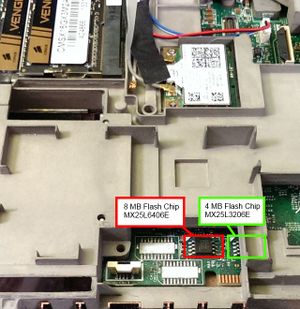Board:lenovo/t530: Difference between revisions
Eocallaghan (talk | contribs) |
|||
| Line 55: | Line 55: | ||
* ME(Management Engine) => you do not have to touch it (just leave it where it is) | * ME(Management Engine) => you do not have to touch it (just leave it where it is) | ||
* EC(Embedded Controller) => you do not have to touch it (just leave it where it is) | * EC(Embedded Controller) => you do not have to touch it (just leave it where it is) | ||
!!! WARNING !!! | |||
The ME is pretty much completely evil in both every imaginable and unimaginable way! | |||
This Coreboot port really only serves the purpose of two things: | |||
1.) Increasing the attack surface of the ME controller. | |||
2.) Replacing UEFI junk. | |||
There is very little "freedom" gained from Coreboot as the ME controller is /so/ utterly pervasive! | |||
Do your research! | |||
== GPIO layout == | == GPIO layout == | ||
Revision as of 14:38, 15 September 2014
Specification
The machine has:
- Chipset: Intel QM77
- GPU's: Intel Integrated HD Graphics
: Discrete NVIDIA NVS 5400M (1 GB VRAM) with Optimus Technology
and pci configuration of:
-[0000:00]-+-00.0 8086:0154
+-02.0 8086:0166
+-16.0 8086:1e3a
+-19.0 8086:1502
+-1a.0 8086:1e2d
+-1b.0 8086:1e20
+-1c.0-[02]----00.0 1180:e823
+-1c.1-[03]----00.0 8086:4238
+-1c.2-[04-0b]--
+-1d.0 8086:1e26
+-1f.0 8086:1e55
+-1f.2 8086:1e03
\-1f.3 8086:1e22
Status
Thanks for your interest in Lenovo T530 port. Issues:
- EHCI output failure after sysagent
- no S3
- no MRC cache
- MRC needs watchdog
- yellow USB port isn't powered in power-off state.
(Tested on X230 *not tested* on the T530):
- RAM module combinations of 8G+8G
- USB (both 2.0 and 3.0 ports)
- Video (both internal and VGA)
- Expresscard slot (including hotplugging)
- Sound (integrated speakers, integrated mic, external headphones, external mic)
- LAN
- mini-PCIe slots (both wlan and wwan)
- Linux (through GRUB-as-payload)
- Windows (through GRUB-as-payload loading SeaBIOS image from disk; you have to use extracted VGA blob, dumped from memory isn't good enough)
- SD card slot
- Thermal management
- Fingerprint reader.
- Webcam
- Keyboard backlight
- Thinklight.
- bluetooth
- dock
- msata (fixed in commit c8f54a1109072706e2fa091dc9ab4ad3eb057b42)
Not tested:
- mini displayport (probably works)
Proprietary components status
- CPU Microcode (optional)
- ME(Management Engine) => you do not have to touch it (just leave it where it is)
- EC(Embedded Controller) => you do not have to touch it (just leave it where it is)
!!! WARNING !!!
The ME is pretty much completely evil in both every imaginable and unimaginable way! This Coreboot port really only serves the purpose of two things:
1.) Increasing the attack surface of the ME controller.
2.) Replacing UEFI junk.
There is very little "freedom" gained from Coreboot as the ME controller is /so/ utterly pervasive! Do your research!
GPIO layout
This information should not be considered reliable in any way, shape or form
- GPIO57 - OUT - controls..
General Purpose Events layout
- GPE? - EC SCI
- GPE? - EC SMI
Flashing

T530 has 2 flash chips of 8M and 4M. They're concatenated to one virtual flash chip of 12M which is itself subdivided in roughly in 4 parts:
- Descriptor (12K)
- ME firmware (5M-12K)
- System flash (7M)
ME firmware is not readable. Vendor firmware locks the flash and so you need to flash externally (unless until someone figures out a way around it).
Proceeds as follows:
- Turn off your laptop, remove battery and AC adapter.
- Remove the keyboard.
- Connect your external SPI flasher to the top SPI chip which is under palm resting space, on left side of the board. It's a 4M chip. IF you've chosen CBFS_SIZE 4M or smaller that's the only chip you need to reflash.
I recommend using SOIC clip. Depending on the flasher you use, you may have to use separate 3.3V source. Make sure not to feed more than 3.3V ot the chip. I used buspirate as flasher and 3.3V power lines from another computer.
- Read the flash. Twice. Compare the files to be sure. Save a copy of it on
external media.
flashrom -p <yourprogrammer> -r flash.bin flashrom -p <yourprogrammer> -r flash2.bin diff flash.bin flash2.bin
If they don't match, do not proceed. If the file is 8M, you're flashing wrong chip, connect to the right one.
- Write the flash. Since you have to write only top 4M, first split out those 4M:
dd of=top.rom bs=1M if=build/coreboot.rom skip=8
- Use flashrom to flash top.rom.
If you have trouble reading the chip successfully, the most common problems are
- insufficient power supply
- bad contacts
- too long wires
- bad pinout
The cable shipped with buspirate was too long, and needed to be trimmed.
See also In-System Programming